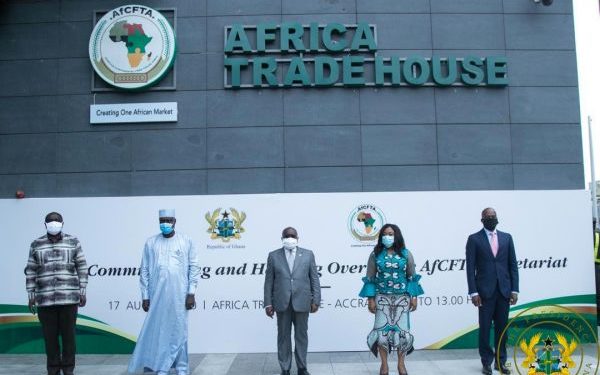African countries’ vision of opening up the continent to trade, especially among member countries, has taken shape with the official inauguration and handing over of the African Continental Free Trade Area (AfCFTA) secretariat in Accra.
Ghana won the bid in July 2019 to host the secretariat of the AfCFTA and as part of the obligations and commitment in the Host Country Agreement, the country is required to provide a fully-furnished office complex as the headquarters of the secretariat and an official residence for the Secretary-General.
SEE ALSO: Ghana ready to host AfCFTA despite Covid-19
Speaking at the inauguration of the secretariat, President Nana Addo Dankwa Akufo-Addo, called on all African leaders to put in the necessary structures and resources to make the agreement that has created the largest trading bloc in the world become a success for the prosperity of the African people.
“We are now the world’s largest free trade area since the formation of the World Trade Organisation and we must make it happen. It will provide the vehicle for us to trade among ourselves in a more modern and sophisticated manner. It will offer a huge opportunity to exploit the abundant resources of our great continent for the benefit of our people. So I urge member states to put in extra efforts to complete all outstanding implementation issues,” he said at the inauguration ceremony held in Accra.
The AfCFTA provides the opportunity for Africa to create the world’s largest free trade area, with the potential to unite 1.3 billion people, in US$2.5 trillion economic bloc and usher in a new era of development.
The main objectives of the AfCFTA are to create a continental market for goods and services, with free movement of people and capital, and pave the way for creating a Customs Union. It will also grow intra-African trade through better harmonization and coordination of trade liberalization across the continent. It is estimated that intra African trade will increase by as much as US$35 billion per annum or 52 percent by 2022.
Commenting on the benefits the trade pact will bring to the continent, Minister of Trade, Alan Kyerematen, said among other things, it will increase the level of intra African trade through better harmonization and coordination of trade within the African continent, and address the challenge of small fragmented markets in Africa by creating a single continental market which will lead to economies of scale.
He further stated that the trade deal will add value to Africa’s abundant natural resources and promote economic diversification and industrialization, and promote the development of regional value chains and facilitate cross border investments in Africa which will open up market access opportunities for SMEs in Africa on preferential trade terms.
The Secretary-General of the AfCFTA, Wamkele Keabetswe Mene, also said the current coronavirus pandemic’s impact on global trade should be a wakeup call for the continent to see the opportunity AfCFTA provides and work towards achieving it.
“The ongoing COVID-19 crisis has ravaged global economic activity, has severely disrupted trade and global supply chains, and of course, has had a negative effect on global public health. Africa should not despair and fall into despondency – from a trade perspective, we should see this crisis as an opportunity – through the AfCFTA we have an opportunity to reconfigure our supply chains, to reduce reliance on others and to expedite the establishment of regional value chains that will boost intra-Africa trade and secure Africa’s productive capacity for generations to come,” he said.
He further assured that the secretariat will take the necessary steps to ensure that the transshipment of goods from countries that are outside the agreement does not become a significant risk to the trade agreement.
“The AfCFTA Secretariat will work closely with customs authorities to ensure that through robust implementation of the AfCFTA rules of origin regime, the prevention of transshipment is an absolute priority. The AfCFTA must create jobs, it must not create job losses through transshipment of third country goods into the AfCFTA market,” he added.
Source: thebftonline








